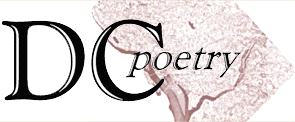A web site devoted to promoting the "experimental," "non-mainstream," etc., writing community in the D.C. area first arose a year ago under the stewardship of Allison Cobb and Jennifer Coleman. During that year it was used primarily to disseminate information about upcoming readings and to sample poems of those who have read at the various reading serieses in D.C. during the given year. And while continuing to do those things, I thought the site might also be able to document the D.C. scene in other ways.
The idea behind the Oral History Project is to gather responses from former and present D.C. area poets to some fairly broad questions about their involvement and experiences in the scene. Since becoming involved in the scene here around that time, I've been amazed at what a rich and interesting history experiemental writing in D.C. has and yet how little about the scene has been documentated (save, for example, Joan Retallack's essay on Mass Transit in the Washington Review from 1988. I've called it "oral history" project ambivalently, since I have in mind the kind of stories and remarks people tell and share in each others' company: such a gathering would be quite difficult today with everyone scattered across the country, but my hope is that a conversation of sorts might be generated and that the medium of the worldwide web might capture something of an oral tradition.
Jean Donnelly and I came up with a list of questions or topic areas that we wanted people to respond to (listed below), and Tina Darragh helped us flesh out the list of possible contributors and hunt down their email addresses. Potential contributors were encouraged to treat the questions not as an essay exam but as a rough guide to shaping their responses.
--Tom Orange [October 2000]
1) What brought you to D.C. and when, or if you already lived in the area, what were you doing?
2) Were your initial contacts with the poetry community at that time? Who were your first acquaintances, how did you first meet and/or continue to meet?
3) What were the primary venues for the gathering of the community at the time? (reading serieses, performances, bookstores, publishing ventures, etc.)
4) What was the kind and level of activity in the scene? Who was your audience? Who were the featured out-of-town visitors? What were the big events? What kinds of interactions were going on among the community's members?
5) What were the gender, race, and class dynamics involved in the community at the time?
6) Was there at all a sense amongst yourselves of factors or qualities that made the scene identifiable with the place that is D.C.? a style of writing, a set of concerns, editorial stances, etc.? Similarly, was there at all a sense of the same held by outsiders looking in?
7) D.C. has never really gotten the attention it deserves in the histories of alternative poetry that are being or have been written (e.g., language poetry as an almost purely bicoastal, NYC-SF phenomenon; do you agree or disagree, and why do you think that is (not) the case?
8) What were the limitations of the scene or community? things that you felt should have been done that weren't, etc.
9) Was there a moment at which the community or scene as you knew it began to change, for better or worse? Took off in exciting new directions or fell flat on its face unable to get up?
10) If you've since left the d.c. area, what took you elsewhere? What were your feelings about the community or scene then and now?

